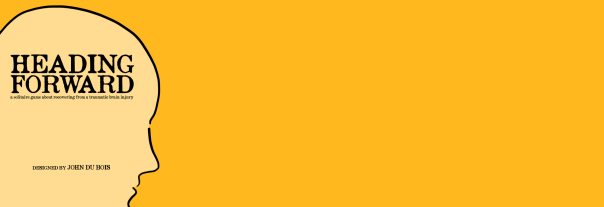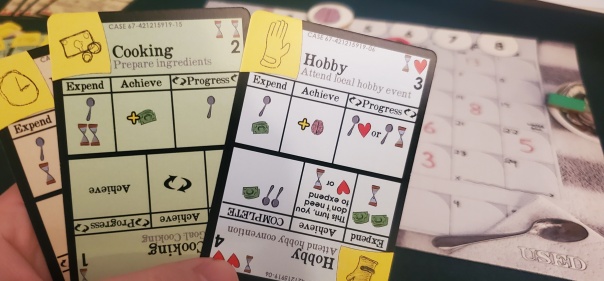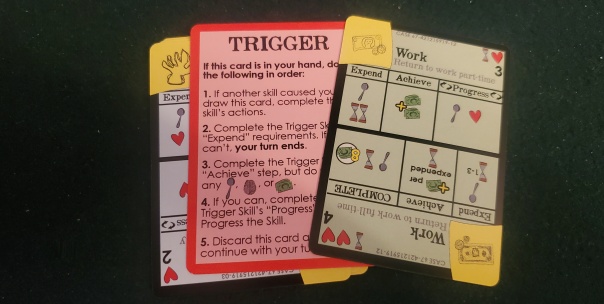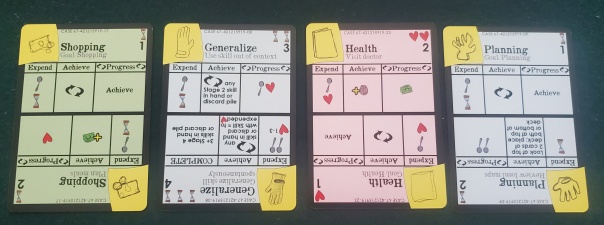Triggered Effects
I suffer from panic attacks and poor health.
How’s that for an opener? I’m normally reserved about sharing personal details like that. But there it is: I’ve suffered from health complications my entire life, a handful of which have necessitated serious corrective surgeries and lengthy periods of recovery. Heading Forward, the solitaire game designed by John du Bois, makes sharing those details easier, or at least less frightening. Maybe those are the same thing. Empathy isn’t the first emotion I would expect to feel when playing a board game, but this demonstrates exactly how to express something deeply personal via a handful of cards and some punchboard spoons.
So you’ve suffered a brain injury.
Like most people, I don’t know the first thing about brain injuries. Okay, maybe that isn’t entirely true. A guy in my neighborhood took a header off his motorcycle when I was a kid. Physically, he was the same. In every other regard, he couldn’t have been more different. For two years, his family had to hang signs around the house directing him to the bathroom, the bedroom, the kitchen. Almost twenty years later, he’s holding down a job as a bagger at the grocery store. I spent enough time in their home to see some fraction of his struggles. The smallest portion. Enough to terrify me into fastidious helmet-wearing.
But when we get right down to it, that’s almost nothing.
Heading Forward centers the process of recovery. You have a set number of weeks to complete a program of rehabilitation overseen by your insurance company.
At least you have insurance. “At least.” That’s the sort of thing people say when they can’t find better words. It’s hard to know how bad At Least can hurt until you’re on the receiving end. At least you have your family. At least you can get pregnant. At least you have your health. In this case, at least the insurance company is willing to shell out for your rehabilitation. Not that they’re giving you any leeway. If after a few weeks you’ve demonstrated sufficient progress, you get to continue the program. That’s what victory means: that you’ve earned a continuation. That even though you, the player, will now box up the components and walk away, you, the patient, the brain injury victim, must continue. Your entire life has become a Sisyphean parody. Strange as it seems, the alternative is worse. Fall behind, and the company will decide you aren’t pulling your weight and give you the boot. In a for-profit healthcare system, even rehabilitation must be a hustle.
It’s easy to expect message games to be dour. They’re there to impart a message, the thinking goes, not to keep you entertained. Which is perhaps why Heading Forward works as well as it does. I find myself looking forward to setting it up again. The card play is reminiscent of something by John Clowdus or Carl Chudyk. Every round sees you drawing multiple handfuls of cards and using them, one at a time, as individual sessions in your recovery. At the outset, that means working with a hand of three cards. These represent notions or obligations. “Shopping,” maybe. Family. Planning. Chores. Driving. Memory. Little things. Things that come automatically to most adults. Background noise. Rest. Attention. The ability to focus. Things we take for granted.
You take these things, these cards, and you upgrade them. That’s the idea, anyway. To use a card, you expend some resources. There are plenty to keep track of. Too many for someone who can barely think about what they need to think about, let alone write down a shopping list, let alone purchase ingredients from the supermarket. Hearts and hourglasses adorn your cards, letting you select which tasks to forego in order to accomplish others. Money is necessary for hobbies and shopping and healthcare, but almost impossible to accrue when you can’t work. Spoons, from the popular metaphor for limited energy, are appropriately sparse. Brains dictate how many cards you can draw at a time, how many concepts you can hold onto before they float away. When a card is upgraded, you either rotate it to its next level or find its pair from a deck set to the side. Their requirements get progressively tougher. Fail to use them and they atrophy back to their previous level. Weren’t you better at this just a few days ago? Where’d it go? What’s wrong with you?
Something happens around the midgame. It might be Heading Forward’s most insightful merger of gameplay and message. As soon as you make some progress, things begin to fall apart. You have a few cards upgraded. Generalization and memory have transformed into goals, then into exercises, then into the possibility of real recovery. Except you’re moving too fast. Your brain fog is clearing, but that means you’re all too aware of the things you still can’t accomplish. In game terms, that means you’re drawing more cards than you can actually use. Or perhaps you’ve picked up some spoons but you don’t have anything to spend them on — your body feels better, but your head can’t keep up. Or you’ve reached the point where you want to focus on a hobby, or friends and family, except you don’t have any money. The delicate homeostasis is thrown into disarray. Cards are spent with too little effect. The days roll by too quickly. Skills atrophy. You spend cash and resources spinning your wheels, desperate to not lose more of the selfhood you’ve clawed back from the abyss.
And then something triggers you.
I mentioned panic attacks. Years of therapy have taught me how to manage them. Mostly. “Manage” is a flexible word. When the cavalry thunders down the hill, I manage them the way a legionary manages their shield and pilum. I know how to brace. How to breathe. How to sliver my attention. How, in some cases, to confront the terror bearing down on me. Other times, I’m transported back there, hands grasping pine needles and old leaves and screaming into cold air. What triggers it? I wish I knew. I feel it right now. At a safe remove, far enough away that it’s intellectual rather than visceral, but vibrating like hooves on distant stone all the same. The thunder fades but never quite settles.
Heading Forward gets it. Every game, you pick a card at random. That card is replaced by a trigger card, an angry red wound that appears in every reshuffled deck. When it slouches round, the trigger forces you to pay the replaced card’s costs. It even upgrades if possible, making it harder to confront with each blighted reincarnation. Meanwhile, that card’s benefits? Forget about those. Maybe the trigger is family, or budgeting, or chores. Each possibility implies its own trauma. It takes and takes and takes. It never gives. It never leaves. With enough time and attention and resources, it can be managed. One card in the game, Health, can remove it when fully upgraded. Frankly, that’s a misstep. A false promise. More often, the trigger sticks around forever.
But here’s the beautiful thing about Heading Forward. Despite the bleakness of its topic, despite the empathy it all but forces the player to shoulder, this is an optimistic game. It proposes that wellness is a process, and an achievable one at that. However incremental, however hard-fought, however restricted by healthcare institutions and insurance companies — progress! Like certain techniques of modern recuperation, it gamifies every step. It shows how even terrible traumas can be confronted. And it reminds us of recovery’s most important hope: It isn’t that the trigger ever goes away. It’s that our capacity grows to meet the challenge.
Heading Forward is a game you should play. I fear I’ve done it a disservice by talking more about its import than its playability. Rest assured, it’s no slouch as a game about upgrading cards and balancing resources. Its more important identity, however, is as a game that asks us to see, really see, if only in part, what it’s like to seek wellness and a sound mind when everything conspires to throw a life into disarray. Whether the offending agent is an injury or something more systemic, du Bois exposes the vulnerable heart underneath. It asks for patience and grace and understanding. That’s a rare enough missive in any medium. What a pleasure to discover it in ours.
(If what I’m doing at Space-Biff! is valuable to you in some way, please consider dropping by my Patreon campaign or Ko-fi.)
A complimentary copy was provided.
Posted on June 8, 2022, in Uncategorized and tagged Alone Time, Board Games, Heading Forward, Hollandspiele. Bookmark the permalink. 18 Comments.





Thank you for your openness in writing about this hard topic. Mental illness of any sort is hard on everyone involved. One day, I might write about my own struggles with dealing with the mental illness of someone I love. For now it’s one day at a time.
I’m sorry to hear that, Richard. Mental and emotional illnesses are so incredibly hard to weather. All the best to you and yours.
I am very sorry to hear of your health problems. You writing is a display of courage and bravery, so panic attacks come as a surprise
Thanks, Gomeril. It’s all good! None of us escape without some bumps and scrapes.
Hey there, just wanted to say this is a fantastic review.
I really want to try this game as the mechanics sound fantastic, but I’m worried the game may be a bit too somber of a theme. What did you think of it?
If you lost, did you feel too down after finishing it?
Not personally. Usually I felt some sense of accomplishment at how far “I” had come, regardless of whether the insurance company approved.
Thank you Dan for this review, and John/Hollandspiele for this game!
Thanks for reading, Chris!
A student of mine designed a game with a lot of similarities to this one around PTSD and trauma. Their game is much less “winnable” as they mean it as a teaching tool for professors to understand just how difficult it is to exist with trauma in a system that doesn’t support them.
I’m delighted to see this one come from Hollandspiele as I love their work. Thanks for the in depth exploration!
I’m happy to hear this is a design space more people are thinking about!
Dan, I’m also aware of other two designs on mental health. “Bipolar” was designed and published in the Netherlands, while there is an unpublished game co-designed by Jason from the Building the Game podcast called “Compulsed”. I recall they discuss the design in episode 361, which also centers around mental health and board game design. I recommend the episode (and the podcast, if you haven’t heard about it).
Thanks for the recommendations, Pablo!
Thank you for bringing this game to our attention and thank you for your openness.
I supported my wife through her stroke recovery and was very adjacent to much of what you describe in the game. So much so that I’m hesitant to play the game, although I am also drawn to how a game can represent the experience.
Thanks for reading, chadrum, and I’m sorry to hear about your wife.
Pingback: Strangling on Bootstraps | SPACE-BIFF!
Pingback: Best Week 2022! The Traumatics! | SPACE-BIFF!
Pingback: 2022 In Review: An In-Depth Report » The Daily Worker Placement
Pingback: Join in the Restivities | SPACE-BIFF!